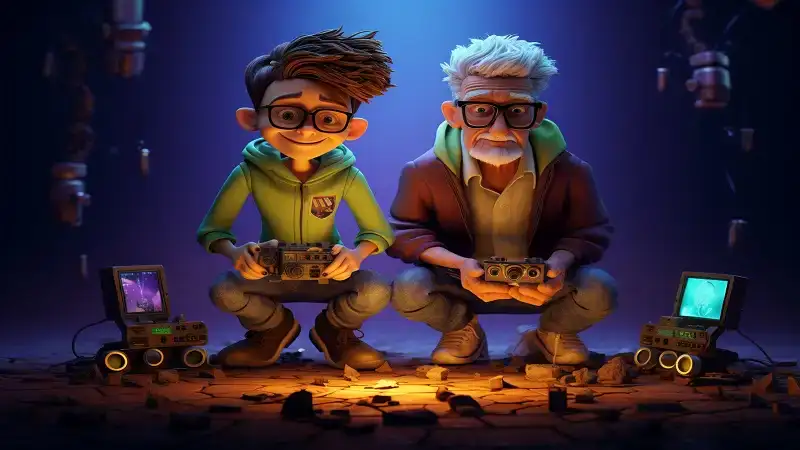Fortnite has taken the gaming world by storm. Launched in 2017 by Epic Games, this battle royale game quickly became a cultural phenomenon. With its vibrant graphics, engaging gameplay, and frequent updates, Fortnite stands as one of the most influential games of the 21st century. Let’s dive into the elements that make Fortnite undeniably cool, from its”cool:bbkj12raqso= fortnite” game mechanics to its impact on pop culture.
A New Era in Gaming
Fortnite didn’t just introduce a new game; it introduced a new era in gaming. While the battle royale genre existed before Fortnite, no game”cool:bbkj12raqso= fortnite” popularized it like this one. Fortnite dropped 100 players onto an island where only one could emerge victorious. This last-player-standing concept wasn’t unique, but Fortnite made it mainstream.
The game’s combination of shooting mechanics and”cool:bbkj12raqso= fortnite” building elements set it apart. Players didn’t just fight; they built structures for defense or offense, adding a layer of strategy. This dynamic gameplay kept players engaged, and it was accessible enough for newcomers while still offering depth for seasoned gamers.
Fortnite’s free-to-play model also contributed to its success. Unlike traditional games, which required an upfront purchase, Fortnite allowed anyone to download and start playing for free. Revenue came from in-game purchases, primarily cosmetics like character skins, emotes, and weapons. This model didn’t just make the game accessible; it made it a social experience where players could express themselves through their in-game avatars.
Cultural Impact
Fortnite transcended the gaming community to become a cultural icon. Celebrities, athletes, and influencers began playing and promoting the game, which elevated its status. Rapper Drake famously teamed up with popular streamer Ninja for a Fortnite session that broke viewership records on Twitch. This moment signified the game’s crossover appeal and”cool:bbkj12raqso= fortnite” helped propel it further into the mainstream.
The game’s in-game events, like the Travis Scott concert, showcased Fortnite as more than just a game. These events blurred the lines between gaming and entertainment, creating immersive experiences for players. Travis Scott’s virtual concert attracted over 12 million players, making it one of the most significant virtual events ever. It wasn’t just a concert; it was an experience that only Fortnite could offer.
Fortnite also influenced fashion and music. The game’s skins, or character outfits, became a form of digital fashion. Players could customize their avatars with a wide range of outfits, from futuristic warriors to iconic pop culture figures. This customization turned Fortnite into a platform for self-expression, similar to how people use fashion in real life. The in-game dances, or emotes, also crossed over into real life, with kids and adults alike replicating them at parties, in schools, and even in professional sports.
Community and Connectivity
One of Fortnite’s most remarkable achievements lies in its ability to build a strong and loyal community. The game’s developers, Epic Games, regularly engage with their audience, providing frequent updates, listening to player feedback, and involving the community in the game’s development. This connection between developers and players has fostered a sense of ownership among the community, making them feel like they are part of something bigger.
Fortnite’s cross-platform play also revolutionized how gamers connect. Players from”cool:bbkj12raqso= fortnite”
different devices—whether it’s a console, PC, or mobile—could all play together. This cross-platform compatibility broke down barriers between gamers, allowing friends to connect and play regardless of their device. This inclusivity helped build a massive player base and kept the community vibrant and engaged.
Epic Games didn’t stop at just building a community; they”cool:bbkj12raqso= fortnite” created a social space where players could hang out and have fun. Fortnite introduced modes like “Party Royale,” where players could socialize without the pressure of competition. This mode featured concerts, movie screenings, and other social activities, turning Fortnite into a digital playground. This social aspect of the game”cool:bbkj12raqso= fortnite’ helped it appeal to a broader audience, including those who might not be traditional gamers.
Innovation and Evolution
Fortnite thrives on innovation. The game isn’t static; it evolves constantly. Epic Games regularly introduces new content, including skins, weapons, and game modes, ensuring that players always have something fresh to look forward to. This constant stream of updates keeps the game exciting and prevents it from becoming stale.
One of the most innovative aspects of Fortnite is its live events. These events, often tied to the game’s storyline, happen in real-time and can only be experienced once. For example, the in-game event where the entire map was sucked into a black hole and the game went offline for a few days, left players in suspense. This event, known as “The End,” was a masterclass in building anticipation and keeping players hooked. When the game returned with a new map, it felt like a fresh start, breathing new life into the game.
Fortnite’s collaborations with other brands and franchises also demonstrate its innovation. The game has partnered with major brands like Marvel, DC, and Star Wars, bringing iconic characters and themes into the game. These collaborations create a sense of excitement and anticipation, as players look forward to what’s coming next. It also helps Fortnite stay relevant by tapping into popular culture.
The game’s “Creative Mode” is another example of Fortnite’s innovation. This mode allows players to build their worlds and game modes, giving them the tools to create unique experiences. This user-generated content has led to the creation of a vast array of mini-games and custom maps, adding even more variety to the game. It also empowers players to express their creativity and share their creations with the community.
Competitive Scene and Esports
Fortnite’s competitive scene has become a significant part of its identity. The game’s accessibility and popularity made it a”cool:bbkj12raqso= fortnite” natural fit for esports. The Fortnite World Cup, held in 2019, was a landmark event in the gaming world. With a prize pool of $30 million, it attracted players from around the globe, culminating in a final that saw 16-year-old Kyle “Bugha” Giersdorf take home the grand prize of $3 million.
This event wasn’t just a milestone for Fortnite; it was a milestone for esports as a whole. It demonstrated that competitive gaming could attract massive audiences and offer substantial financial rewards. Fortnite’s success in esports has inspired a new generation of gamers to pursue competitive gaming as a career.
The game’s competitive modes, like Arena and Cash Cups, provide regular opportunities for players to test their skills and earn rewards. These modes cater to both casual and hardcore players, ensuring that everyone has a chance to participate in the competitive scene. Fortnite’s ranking system also encourages players to improve their skills and climb the ranks, adding a sense of progression and achievement.
Criticism and Controversy
No game as popular as Fortnite can avoid criticism and controversy. The game has faced backlash for its impact on children and teenagers, with some parents and educators expressing concern over its addictive nature. The game’s in-app purchases have also sparked debates about the ethics of microtransactions, especially concerning younger players who might not fully understand the value of money.
Fortnite has also faced legal battles over its emotes, with several artists and performers claiming that the game used their dance moves without permission. These lawsuits have raised questions about intellectual property rights in the digital age and how they apply to virtual goods.
Despite these controversies, Fortnite has continued to thrive. The game’s developers have taken steps to address some of these concerns, such as implementing parental controls and offering refunds for in-game purchases. These measures have helped to mitigate some of the criticism and maintain the game’s popularity.
Final thought
Fortnite’s cool factor goes beyond its gameplay; it’s a cultural phenomenon that has redefined what a video game can be. Its blend of engaging mechanics, vibrant community, and constant innovation has kept players hooked for years. Fortnite isn’t just a game; it’s a social platform, a creative outlet, and a competitive arena all rolled into one.
The game’s impact on pop culture is undeniable, influencing”cool:bbkj12raqso= fortnite’ fashion, music, and even the way we connect with each other. Fortnite’s ability to evolve and stay relevant in a constantly changing gaming landscape is a testament to its developers’ vision and commitment to their community.
In a world where games come and go, Fortnite has cemented its place as a cultural icon. It has changed the gaming industry, setting new standards for what a video game can achieve. As long as Fortnite continues to innovate and engage its community, it will remain at the forefront of the gaming world, a shining example of what makes a game truly cool. See More









